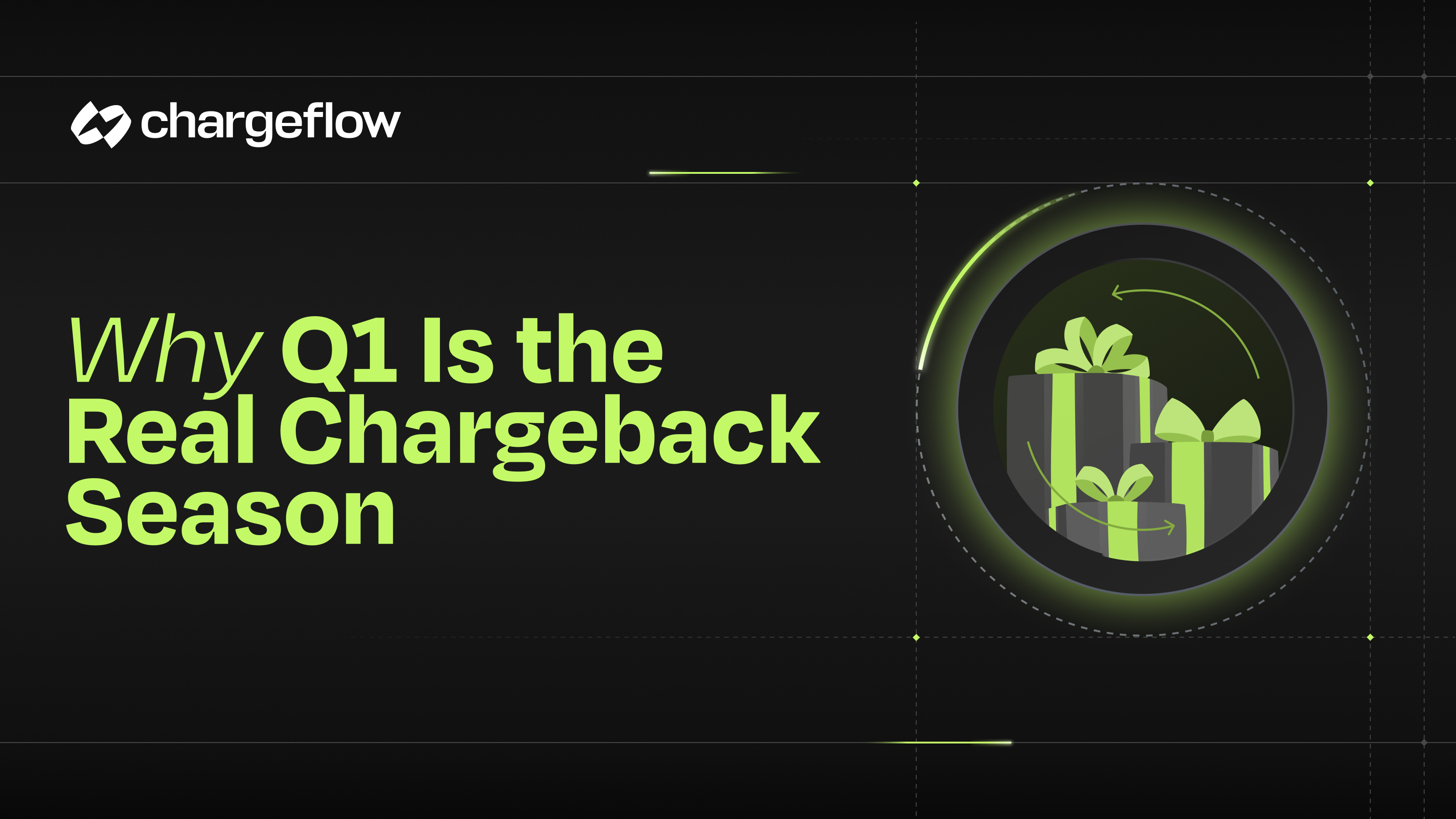Merchant Guide on Handling eBay Payment Disputes

Chargebacks?
No longer your problem.
Recover 4x more chargebacks and prevent up to 90% of incoming ones, powered by AI and a global network of 15,000 merchants.
Effectively managing payment disputes is essential for any eBay merchant's success. Craft detailed item descriptions, deliver excellent customer service, accurately represent merchandise conditions and shipping times, and keep eBay policies in mind. But that doesn't mean disputes won't arise. The odds are increasingly stacked against merchants. So, where traditional methods fall short, technology is stepping in. Chargeflow is that tool today.
With 134 million active buyers on the platform, eBay is one of the most popular online marketplaces. eBay currently has over 2.3 billion active listings from merchants seeking to capitalize on the platform’s high traffic.
However, while eBay provides a platform for these transactions, payment disputes still arise between buyers and sellers. Payment disputes occur when a buyer seeks to reverse a completed transaction. In such cases, the said buyer notifies their bank, credit card issuer, or payment provider about the issue, authorizing them to reverse the bill.
As an eBay merchant, you should know how to handle such cases. Failing to resolve payment disputes amicably often leads to negative feedback, a damaged reputation, and even suspension from eBay.
So buckle up. Sit back. And review these actionable insights for resolving eBay payment disputes. This comprehensive guide will unveil the types of eBay payment disputes you should expect, their reasons, their impact on your business, and how to make each case go away fast! By the end of this piece, you’ll learn how to maintain a positive reputation on eBay and conduct business with buyers confidently.
Understanding eBay Payment Disputes
No seller wants to deal with transaction reversals. They are frustrating and time-consuming.
Sadly, payment disputes occur frequently on eBay...just like other marketplaces like Shopify. You do yourself a great disservice if you don’t understand the different dispute types that can arise.
As an eBay merchant, you may experience disputes with buyers over issues such as non-delivery, damaged items, or items not as described. Let’s examine the types of eBay disputes in detail.
Types of Payment Disputes on eBay
The various payment disputes that can arise on eBay are as follows.
1. Item Not Received (INR) eBay Dispute
INR disputes occur when a buyer claims they did not receive the item they purchased on eBay. INR eBay disputes can happen for several reasons. First, that is, assuming the buyer is honest, the package may have been lost or stolen. It can also be that the shipping information you used was incorrect or the order delivery timeline wasn’t met due to delayed shipping.
We’ve incidentally seen a growing number of cases where buyers file “item not received” eBay disputes just to get freebies. In such cases, the payment provider is deceived into issuing a chargeback for a case with zero merits.
2. Item Not as Described (INAD) eBay Dispute
INAD disputes arise when an eBay buyer receives an item they believe is materially different from the description you, the merchant provided on eBay. INAD disputes can happen when an item's condition or features are misrepresented. They can also be the result of counterfeit or damaged items.
3. Unauthorized Transaction eBay Dispute
Transaction unauthorized eBay disputes occur when a buyer claims they did not authorize a specific transaction they were billed for. For legitimate cases, unauthorized transaction disputes happen when a buyer's eBay account is hacked or their payment information is compromised.
It could also be that the buyer forgot about the transaction or did not recognize the merchant’s order description. Nevertheless, as noted earlier, most unauthorized eBay disputes have turned out to be false cases of liar-buyers looking to steal from merchants with friendly fraud.
Reasons Behind Payment Disputes on eBay
Payment disputes are rising industry-wide.
In a recent press release with WorldPay, Mastercard noted that chargeback volumes could reach 337 million by 2026, a 42% increase from 235 million in 2023.
There are several reasons for these cases. For eBay payment disputes, some common cardinal reasons include (but are not limited to) the following:
- Friendly fraud, where buyers intentionally file false claims to deceive merchants.
- Misunderstandings or miscommunications between buyers and sellers on eBay.
- Buyer dissatisfaction with the item received.
- Shipping delays or damage during transit.
- Technical issues on eBay, such as glitches or errors in the payment system.
- Account takeover, where scammers use compromised identities to make purchases.
- Policy misunderstandings, where a buyer misunderstood the seller’s return and refund policy.
- Merchant errors, such as double billing, overbilling, or other clerical errors.
Impact of Payment Disputes on eBay Merchants
Payment disputes have a detrimental impact on eBay merchants. As we observed earlier, they cause financial and reputational damage to merchants.
If a dispute is not resolved in your favor, you’ll have to refund the buyer and pay a chargeback fee, which eBay charges $20 per dispute fee, excluding sales tax. Chances are you’ll also risk negative feedback on your eBay account. Additionally, too many payment disputes make eBay restrict or suspend your account.
Review the broader impact of payment disputes, from operational to overhead costs.
To protect yourself from the negative impact of payment disputes, you've got to understand eBay's policies and procedures for handling these disputes effectively. In this section, we'll walk you through these established eBay guidelines for dispute prevention. We'll also discuss standard chargeback prevention best practices for maintaining a positive reputation on eBay.
Best Practices for Avoiding Payment Disputes on eBay
Here are battle-tested best practices – covering product description, shipping, and store policy – to help you prevent payment disputes on eBay.
1. Create Detailed Item Descriptions
Research shows that one of the most common reasons for payment disputes on eBay is buyer dissatisfaction with the product received. Crafting detailed and accurate item descriptions for your eBay listings helps prevent such issues.
To achieve that:
- State the exact item name, brand, model, size, color, condition, as the case may be (new, fairly used, remodeled), and any unique features or flaws e.g., Samsung Galaxy S20, 128GB, Cosmic Gray, used with minor scratches).
- Upload multiple high-quality product photos from different angles, showing the merchandise's condition, packaging, and defects. This must match the written description to avoid "item not as described" eBay disputes.
- Clearly state what's included in the purchase (e.g., accessories, manuals, original box) and what's not. That way you prevent assumptions that lead to buyer dissatisfaction.
- Tell the buyer how the item works, including any limitations (e.g., fully functional, battery holds 80% charge, or for parts only, the screen doesn't turn on).
- Explicitly outline your return terms (e.g., 30-day returns, buyer pays shipping.)
A good product description helps buyers make informed purchasing decisions and reduce the likelihood of payment disputes.
2. Provide Excellent Customer Service
Providing excellent customer service is non-negotiable. It helps prevent payment disputes on eBay.
Respond to buyer inquiries on time and be professional. Also, provide accurate and detailed information about the shipping timeline in your customer communications.
Be transparent and upfront with the customer when delays or issues occur (say, stockout or courier service challenges). Work with them to resolve any concerns. Get more vital tips for creating post-purchase experiences that build trust with your buyers so they always talk to you before talking to their card issuer.
3. Make Your Shipping Practices Better
Bad shipping practices often result in payment disputes. Customers often wonder when their merchandise will arrive after placing an order. So delayed shipping and shipping without tracking won't be in your favor.
Use these shipping best practices to avoid unnecessary disputes over merchandise delivery:
- Ship items with tracking, providing buyers and eBay with delivery proof to counter "item not received" claims.
- Ship orders within your stated handling time to prevent disputes over delays. Communicate any delays, as we noted earlier.
- Package merchandise securely with padding and sturdy boxes to minimize damage in transit, especially for fragile items. Include photos of the packed item as evidence in your customer comms.
- Obtain signature confirmation on high-value merchandise to verify receipt. You can also pay for insurance on such orders.
- Upload tracking details to eBay immediately for visibility.
4. Understand eBay's Policies and Procedures
Do you know eBay's rules and regulations? That includes policies on returns, refunds, seller protection, and dispute handling processes.
That's essential. When you get a good grip on the platform policies, you avoid policy-related missteps, strengthen your case in chargeback disputes, and keep transactions with eBay's framework.
For instance, eBay requires merchants to keep relevant messages and supporting order delivery documentation through eBay tools. Failure to do this may result in unwinnable payment disputes.
Understanding eBay policies like "Money Back Guarantee" also helps you know when eBay covers refunds. Presenting tracking proof protects you when a buyer claims product non-delivery. Knowing the allowed return timeline (like a 30-day window) ensures you don't work at cross-purposes with platform rules.
Communicate these policies clearly to your buyers to avoid confusion or misunderstandings.
Initial Steps to Take When a Payment Dispute Occurs on eBay
When a payment dispute happens on eBay, you should do your best to resolve the issue as quickly and effectively as possible. Here are some initial steps you can take to handle a payment dispute on eBay:
1. Identify the Type of Payment Dispute
The first step in resolving a chargeback is to understand the exact payment dispute type you're dealing with. As we highlighted earlier, there are various reasons why buyers file a dispute. The eBay payment dispute you’re dealing with will determine your next moves in countering it.
2. Review the Buyer's Complaint and Documentation on eBay
Once you've identified the type of payment dispute, you should carefully review the buyer's complaint and any supporting documentation they've provided on eBay. Track the specific issues they're raising and try to understand their perspective.
3. Communicate with the buyer on eBay
After reviewing the buyer's complaint, it's crucial to communicate with them on eBay. Send them a message acknowledging their concerns and letting them know you want to resolve the issue. Ask them to provide any additional information or documentation that could help you understand the situation better if need be.
Most chargebacks are false. Yet, it's important to approach communication with open minds. If you succeed in getting them to agree to retract the dispute, provide that information to eBay.
4. Take Steps to Protect Yourself on eBay
While you're working to resolve the payment dispute, it's equally crucial to gather documentation to appeal the case. Relevant documents could include sales invoice, customer communications indicating product reception and satisfaction, and anything else that validates the transaction.
How to Respond to Payment Disputes on eBay
Timely and methodical response to a payment dispute on eBay, ensures you don’t run out of time or miss relevant documentation. Here are the steps to take when responding to payment disputes on eBay:
1. Understand eBay's Dispute Resolution Process
It bears re-emphasizing that eBay has established procedures for handling payment disputes that both buyers and sellers must follow. When a buyer opens a dispute, eBay gives the seller a chance to respond by either accepting or rejecting the chargeback.
eBay’s chargeback response timeline for merchants is 5 calendar days.
We covered the step-by-step process for accepting or rejecting an eBay chargeback in a previous guide.
2. Know the Evidence to Provide for Each Scenario
Winning eBay disputes boils down to your compelling evidence, i.e., the documents you provide to invalidate the customer’s claims.
Remember, eBay is only acting as the middleman between you and the payment provider or card issuing bank. So they’ll send all your documentation to the customer’s bank. Address the buyer's specific concerns and provide only relevant information or evidence to support your case.
Here are the various kinds of evidence to provide when buyer contests transaction validity:
Transaction Not Received or Unrecognized
Evidence to include in your response for physical merchandise (excluding vehicles):
- Tracking details indicating successful order delivery to the correct address.
- Signature confirmation obtained by eBay rules.
- Relevant customer communication validating the bill.
- Order ID, item number, name, and amount paid.
If physical merchandise was picked up in-store, eBay requires that you include the customer's signature on the pickup form or packing slip, in addition to the above.
Order Not As Described
Evidence to include in your response:
- Screenshot of your product page.
- Photograph of the product's condition before shipping.
- Relevant customer communication that helps your case.
Item Returned, But No Refunds Issued
Documentation to include in your response:
- Evidence of issued refund through eBay.
- Proof of product cancellation, if relevant.
- A copy of your return policy.
- Customer communication clarifying why they're not entitled to a refund.
- Other relevant documentation, like evidence that they’ve not returned the product and, therefore, cannot receive a refund according to your policy.
🛑 Recommended: Read our detailed outline on how to submit your compelling evidence for maximum outcome. You can get additional insights from a similar piece on how to tailor compelling evidence to to chargeback reason codes.
3. Be Ready to Appeal the Dispute if Necessary
When you dispute an eBay chargeback, the customer's bank or card issuer will determine the outcome. This can take 90 days or longer, depending on the payment method involved. The funds will be taken from your account during this period.
If you win, they'll restore the cash. But if you lose, the customer retains the "refund". At this point, you can appeal the chargeback outcome by providing additional evidence. The success of your appeal depends on additional documentation provided. That’s why merchants who contest chargebacks manually rarely win because extracting sufficient documentation for this process is quite gruelling.
Common Mistakes to Avoid When Handling Payment Disputes on eBay
Chargeback management is tedious work. Handling payment disputes on eBay is no exception. Quite frankly, it sucks! The odds are rarely in your favor.
Add to that, merchants make rookie mistakes that further compound their woes. Here are some of the most common mistakes eBay merchants make when handling payment disputes and how to avoid them.
1. Ignoring the dispute or failing to respond promptly on eBay
Running out time or ignoring the dispute entirely. This is one of the biggest mistakes eBay merchants make when dealing with payment disputes.
Ignoring the dispute or not responding to it means you lose by default. You even risk account suspension when your chargeback rate goes beyond the acceptable rate. Hence, address the dispute promptly. Follow through until it’s resolved. How to do that profitably today? Automate your chargebacks to recover them on autopilot.
2. Failing to provide relevant compelling evidence
No amount of evidence you provide will be of significant value if they don’t address the chargeback reason code you obtained. Refer to our guide above. Ensure that every piece of documentation you provide speaks to the chargeback reason code.
3. Disregarding eBay's policies and procedures on eBay
As we noted earlier, not complying with eBay's policies and procedures when handling payment disputes is a recipe for injury. One such vital policy is that payment dispute resolution goes through the eBay Seller Hub. You can follow the status of the case from eBay’s Requests and disputes portal.
4. Not accepting a valid chargeback on eBay
A chargeback dispute is unwinnable if the customer has a valid case against you. For example, if you committed a clerical error like double billing, you cannot win such a case by contesting it. A more prudent course of action will be to accept the chargeback and refund the customer.
You might even succeed in convincing them to take store credit if you’re upfront in resolving the case. Refusing to negotiate with the buyer or compromise will most likely be counter-productive in this case. That’s why you need a tool like Chargeflow Alerts to know about the dispute before it happens. With these alerts, you can always intercept a case before it blows out of proportion.
See more rookie mistakes merchants must avoid to prevent chargebacks.
Tips for Maintaining a Positive Reputation on eBay While Handling Payment Disputes
eCommerce is built on a positive reputation.
Maintaining a positive reputation on eBay is non-negotiable for the success of your business. It can make a difference in whether a buyer decides to purchase from you or not. Here are some tips to help you maintain a positive reputation on eBay while handling payment disputes:
1. Consistently providing excellent customer service on eBay
We’ve repeated that excellent customer service delivery is key to addressing various business challenges. And it’s true. Providing thoughtful customer services is one of the most important things you can do to maintain a positive reputation on eBay.
That includes promptly responding to messages, being polite and professional, and going above and beyond to make sure your customers are satisfied with their purchases.
2. Offering refunds or exchanges when necessary on eBay
As noted earlier, offering a refund or exchange may be the best way to resolve a payment dispute on eBay. It may be tempting to fight EVERY dispute. But offering a refund or exchange can help you maintain a positive reputation on eBay when the fight isn’t worth it.
3. Responding to buyer feedback on eBay
Negative feedback isn’t fun to get. They hurt your reputation score. Yet, negative feedback can also help you uncover blindspots and improve your business process. Don’t ignore customer feedback, especially when they’re unsavory.
Whether positive or negative, endeavor to respond to feedback on eBay. Responding to positive feedback shows that you appreciate your customers. At the same time, responding to negative feedback shows that you take customer satisfaction seriously and are willing to make things right.
4. Avoiding future payment disputes on eBay
Assuming you’ve automated your disputes with a system like Chargeflow, you will get verified data to close future loopholes. Chargeflow Insight will help you see customer behavior in real time, so you can derisk transactions effectively.
One of the best ways to maintain a positive reputation on eBay is to avoid payment disputes altogether. So stopping chargebacks from occurring in the first place is a strategic business decision.
Legal Considerations for eBay Merchants Handling Payment Disputes
Are there legal implications of chargeback disputes as an eBay merchant?
The answer is yes. There are legal implications for eBay merchants involved in chargeback disputes, depending on the context, jurisdiction, and how the dispute unfolds.
Here are some ideas to keep in mind:
1. Contractual Obligations with eBay and Payment Processors
As an eBay merchant, you're bound by eBay's User Agreement and policies, as well as the terms of service of payment processors like PayPal or Adyen. These agreements often outline your responsibilities in payment disputes, including how/when to respond, rebuttal rights, allowing reversals for lost disputes, etc. Missteps or non-compliance could mean withheld funds, suspension, or even legal action from eBay to recover losses.
2. Consumer Protection Laws
Bear in mind that buyers initiating chargebacks are exercising their rights under consumer protection laws, like the U.S. Fair Credit Billing Act (for credit disputes) or similar regulations in other countries (e.g., the EU Consumer Rights Directive).
These laws allow buyers to dispute chargeback for non-delivered, defective, or misrepresented goods. Therefore, a chargeback can evolve into a lawsuit in extreme cases where card network arbitration outcome isn’t satisfactory to the consumer.
3. Merchant Liability for Fraud
If a chargeback stems from fraudulent activity like stolen credit card use, you're typically not legally liable unless you knowingly participated in or facilitated the fraud. That said, you could still lose the funds and the item if the chargeback is upheld. Proving fraud can be tricky, and the courts may get involved as we noted in the preceding passage.
4. Tax and Reporting Implications
Accounting for chargebacks is often a challenge, particularly when it comes to taxable income, as funds lost to chargebacks affect your numbers. In some jurisdictions, you may need to report these losses. Failing to do so properly could draw scrutiny from tax authorities. While this is more administrative than legal, it's still a pertinent risk worth keeping in mind.
Final Thoughts
Effectively managing payment disputes is essential for any eBay merchant's success. Follow the best practices shared in this guide to achieve that. Craft detailed item descriptions, deliver excellent customer service, accurately represent merchandise conditions and shipping times, and keep eBay policies in mind.
When disputes arise, ensure you understand the buyer's claim, review their documentation, and respond sincerely. Provide and tailor all required evidence to the chargeback reason code, and consider issuing a refund when the buyer's case is valid, as this can preserve your business reputation.
Nevertheless, manual chargeback prevention has proven challenging in today's complex eCommerce landscape. The odds are increasingly stacked against merchants. So, where traditional methods fall short, technology is stepping in. Chargeflow is that tool. It's a comprehensive chargeback prevention and recovery solution for eCommerce. Chargeflow has become invaluable for merchants of every size. Explore it for yourself. See the difference it can make! Start here.

Chargebacks?
No longer your problem.
Recover 4x more chargebacks and prevent up to 90% of incoming ones, powered by AI and a global network of 15,000 merchants.
















































.png)








